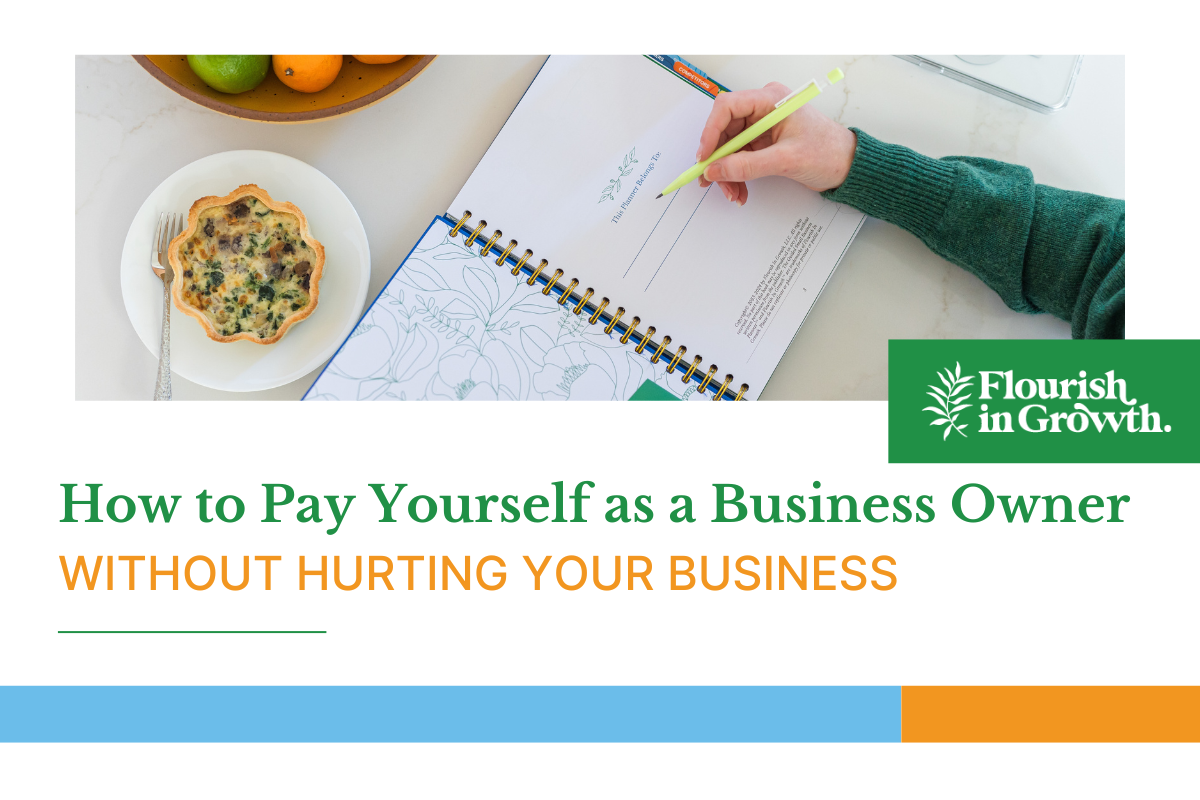How to Pay Yourself as a Business Owner Without Hurting Your Business
If you’ve ever felt guilty about taking money out of your business—or unsure of how to do it the right way—you’re not alone. Many entrepreneurs struggle with finding the balance between reinvesting in their business and rewarding themselves for their hard work. In fact, studies show that at least 26% of business owners don’t pay themselves at all.
In today’s post, we’ll explore the why and the how. First, let’s talk about the psychology behind why paying yourself is so important. Then we will dive into simple steps for how to pay yourself as a business owner without putting your business at risk.
Why Paying Yourself Matters
Understanding how to pay yourself as a business owner is crucial for both your personal well-being and the long-term success of your business. You are building a company and life!
1. It Validates Your Efforts
A paycheck is more than money! It’s an acknowledgment of the time, energy, and sacrifices you’ve invested in your business. For the 81.7% of small business owners* who operate without employees, this is especially significant.
The motivation of a paycheck can be a powerful way to validate that the hard work of managing every detail is starting to pay off (literally!). It fosters a culture of sustainability.
Without a paycheck, it can be hard to tie the risks to a tangible outcome and a sustainable business is one that can support the employees (including you!). According to SCORE*, 61% of small business owners say maintaining their personal financial health is one of their top challenges, emphasizing the need for steady income. Of course, the business needs to generate enough income to afford paying you—more on how to achieve that below!
2. It Establishes Clear Boundaries and Healthy Habits
Separating your personal and business finances helps you manage both effectively and avoid financial confusion between what can be counted as a business or personal expense. When you pay yourself, it can be as simple as writing a check from your business bank account to your personal account. Keeping your business money separated will also make it much easier to file and pay your taxes!
Celebrate every paycheck! When we can create a positive connection with a habit like writing a check to pay ourselves, our brains begin to have a positive association with that activity and I certainly appreciate a mini celebration.

Start with a Short-Term Financial Goal
Understanding how to pay yourself as a business owner begins with setting a personal income goal for the next 12 months. It will vary depending on how long you’ve been in business. For example, if you are an established business owner, your target might be to replace the income you earned from a previous job. So, if you made $50,000 annually, that may be your starting point.
If you are a new business owner and don’t have to replace an income immediately, start smaller with an amount that feels rewarding but manageable. Perhaps your business pays for a monthly bill, such as utilities or internet, or treats you to a weekly dinner out.
Crunch the Numbers
Once you’ve set your income goal, it’s time to calculate your business expenses. Knowing exactly how much you need to earn, and sell, to pay yourself removes the guesswork. Here’s how to do that:
-
Calculate Your business expenses. You’ll need to know your overhead (monthly expenses regardless of how much you sell), and your cost to sell a product or service.
- Calculate Your Cost of Goods Sold. This is how much you spend to sell a product or service. I know that number crunching can feel tedious. Ask for help from a bookkeeper if this is overwhelming you.
- Give yourself a cushion for the unexpected. We don’t like surprise expenses but they do happen in business. Planning ahead for them makes it a bit less painful when they do happen.
- Taxes. Plan to save and pay around 30% of your business net income on your income tax bill. More on how taxes affect personal income here.
-
Add the following to get your total revenue goal.
Income Goal +
Business Expenses +
Cost of Goods Sold +
Unplanned/Surprise Expenses +
(this is a guess but give yourself a bit of cushion)
Taxes =
Total Revenue Goal
- Set Sales Targets: Once you have a total sales revenue goal. Use that to set your sales goal. For example: If your revenue goal is $7,500 per month and your average sale is $75. You’ll need 100 sales to reach your goal, pay yourself, and pay your business expenses.
This simple formula removes the guesswork, making it clear how much you need to sell to hit your goals. Breaking it down like this helps you see exactly what’s needed to pay yourself consistently!
I get into the nitty-gritty of the process of how to pay yourself as a business owner in the Money Chapter of The Guided Small Business Planner.
The Key to Profitability
The key to learning how to pay yourself as a business owner lies in understanding profitability. Simply put, a business can only afford to pay its owner if revenue consistently exceeds expenses. Achieving this balance requires diligent tracking of both income and costs. It also includes a need to maintain a healthy profit margin. Without this information, it’s nearly impossible to pay yourself without risking the stability of your business.
This is where tools like my money spreadsheet become invaluable. The money spreadsheet included with every purchase of The Guided Small Business Planner is a game changer for entrepreneurs. It allows you to calculate exactly how much you need to sell to meet your income goals while considering costs and profit margins. By using this tool, you gain a clear understanding of your business’s financial health and create a sustainable system to pay yourself without putting the opportunity of growth at risk.

Your Business, Your Reward
Paying yourself as a business owner is more than just taking a paycheck, it’s a way to honor your hard work and build a business that supports your life. Setting achievable goals, understanding your finances, and using the right tools can help you create a system that works for you and your business.
Remember, your business should help you live the life you want, not the other way around. With the right strategies in place, you can grow a business that thrives while giving you the rewards you deserve. Taking care of yourself is one of the best ways to ensure your business succeeds.
You May Also Enjoy
The Three Legal Mistakes Your Startup is Making and How They Can Impact Your Business
Don’t Start Your Business with a Business Plan
About Flourish In Growth
We help business owners navigate the ups and downs of building the business they want. Our rules are: Clear, simple, no-fluff, and actionable! Stop doubting yourself. Meet your small business map — The Guided Small Business Planner™. This is a workbook guide with step-by-step instructions for building a strong business foundation. It's your go-to instruction manual with clear instructions for creating a sustainable business. It's not a calendar. It's a guided workbook.





